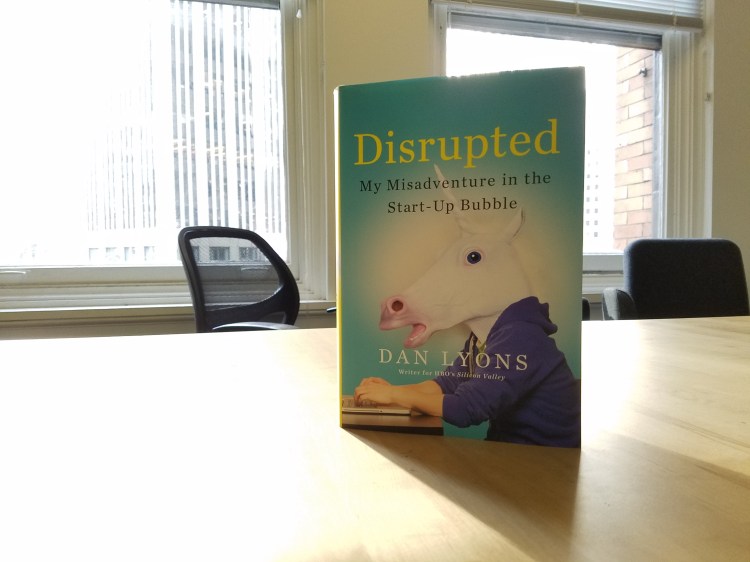The biggest story in tech last week wasn’t an IPO or Facebook’s developer conference. It was the release of a sensational, scandal-brewing book: Disrupted: My Misadventure in the Start-up Bubble. The memoir, written by Dan Lyons, a journalist and a writer for HBO’s Silicon Valley, offers a scathing account of what it’s like to work in tech. The book is based on Lyons’ time working in the marketing department at marketing automation software company HubSpot.
Lyons made a lot of noise leading up to the release of his book. In The New York Times, he criticized employee churn in the tech industry, charging that HubSpot employees were told that “we were ‘rock stars’ who were ‘inspiring people’ and ‘changing the world,’ but in truth we were disposable.” He went further on LinkedIn, asserting that tech companies are unapologetic about age bias. “When it comes to race and gender bias, the people running Silicon Valley at least pay lip service to wanting to do better,” he writes. “But with age discrimination they don’t even bother to lie.”
Lyons is blunt about his disillusionment with what he describes as “startup hell.” In an excerpt in Fortune, he claimed the tech industry is no longer about “great inventions” and criticizes the way many software companies prioritize their business model and marketing over their product.
The stories in Disrupted are surprising given how much they diverge from the image that HubSpot, a darling in the marketing technology space, created for itself. HubSpot literally wrote the book on inbound marketing and commands a lot of respect among marketers. The company is seen as a leader in creating awesome corporate culture. In the past, the company has embraced transparency, sharing its culture code with the general public.
Even if you don’t buy Lyons’ account, he has drawn attention to the work culture of HubSpot and other tech companies. Lyons is not your typical ex-employee — being a journalist, he’s able to share his thoughts more widely than others — but he demonstrates how, in today’s business world, one disgruntled employee (or former employee) can impact a brand’s image. (The HubSpot stock took a hit days after the release of Disrupted, underperforming compared to the market.)
Technology has given more power to your employees. Websites like Glassdoor have made it easy for employees to anonymously rate and review their employers. One tweet or social media post from an employee can tarnish a brand’s image.
You don’t have to look very far to see the empowered employee in action. Just recently, another high-profile tech company, Yelp, found itself in hot water after a former employee wrote a Medium post alleging that she was wrongfully fired. Another Yelp employee criticized the company for its low wages. Late last year, Amazon received criticism after The New York Times published an expose on the company’s intense culture.
In the same way that you can’t stop customers from talking about you on social media, you also can’t realistically police what your employees say about you. If companies are not proactive in understanding employee concerns, they are putting their talent brand at risk.
There are three important business lessons to be learned here.
Do what you say you’ll do
There needs to be consistency between what actually goes on in your company and the image that you project. Otherwise, employees will call you out.
Engage authentically with your employees
The best way to prevent employees from talking about your brand negatively is to identify issues in your company early and correct them before they escalate. But that’s hard to do if you don’t have a systematic way of engaging with your employees. Look beyond the annual employee survey and find ways of listening to people on a more regular basis.
Involve your employees when articulating your culture
Creating a great corporate culture is not just about foosball and ping-pong. A great culture is about having a universal understanding in your company of why you do what you do.
Your corporate culture shouldn’t just be about the values of one person — it should be about the values of the people that work in your company. It’s hard to pinpoint these values and bring them to life if you don’t involve your employees. To build a great culture, you need to involve as many of your employees as possible and welcome their feedback.
Don’t forget about your former employees
The people that used to work at your company could become future customers or brand advocates. If you don’t maintain a good relationship with them, they could drive negative word of mouth. Engaging with your community of former employees could provide insight on what you need to improve on.
In a response to Lyons’ book, Dharmesh Shah, founder and CTO at HubSpot, admits that “HubSpot is by no means a utopian workplace and we don’t appeal to everyone.” That thoughtful and humble response is, in my view, the best possible response from HubSpot at this time.
But the company can’t stop there. To fix its tarnished image in the marketplace, HubSpot needs to revisit its culture and show the world that it genuinely wants to improve its workplace. In doing so, the company should focus on the very same people it wants to please: its employees.
Andrew Reid is founder and president of corporate innovation at Vision Critical.
VentureBeat's mission is to be a digital town square for technical decision-makers to gain knowledge about transformative enterprise technology and transact. Learn More

